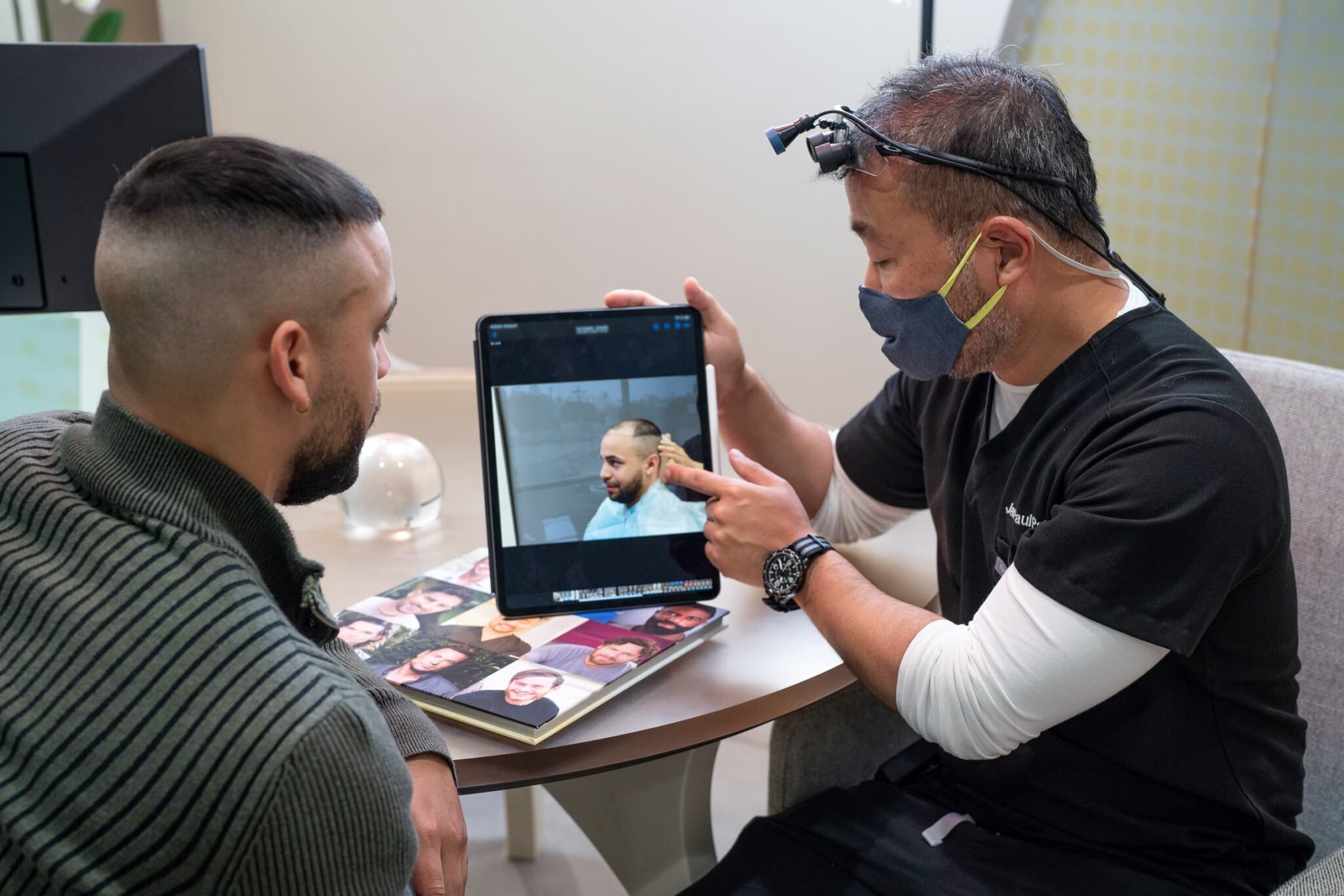
Stock Photo by Stavrialena Gontzou on Unsplash
When transgender people change their appearance to match their gender identity, one of the main focus areas is their hair. How a person grows and grooms their hair is a primary indicator of their gender, making this a vital part of the transition process for transgender people across the board.
However, for male-to-female trans individuals, hair growth can pose somewhat of a challenge early on, especially if the person is looking to attain a long and feminine hairstyle by natural means without the use of wigs.
These challenges are heightened because male pattern baldness occurs at a rate of more than 60% for the average man beyond the age of 30, and the impact of androgenetic alopecia can derail efforts to promote MTF hair regrowth.
Luckily, there are 12 powerful steps you can follow that will help accelerate the regrowth process and improve the quality of the hair that you grow back on your journey. Patience is key here, as always, but applying these tips can also make a big difference for the better. Let’s begin.
At the foundation of every effective transition is a custom strategy formulated by the individual with the close guidance of hormone therapists and other MTF experts and support groups.
The best practices for this process are still being formed as we speak, and every strategy will be different depending on a person’s background, goals, risk tolerance, and other factors.
In working with a hormone expert, MTF individuals will want to advance the transitioning process while also making hair growth and feminization of the hairline a top priority.
This could mean altering a protocol to focus more on hair, allocating effort to hair restoration rather than other objectives in the short term.
Like all aspects of transitioning, it comes down to a matter of tradeoffs when formulating the ideal, personalized plan with the knowledge and resources available.
No matter what, hormone regimens and other medical choices should be made under close supervision and with input from experts each step of the way.
There are a few grooming tips that any MTF should start including in their routines right now.
The first should be obvious: let that hair grow, and be patient. Hair takes a long time to grow, even if you’re doing all the right things.
With that in mind, occasionally trimming hair can prevent fraying and split ends, ensuring that hair continues to grow healthily and sustainably. Getting a trim every month or so should keep things moving in a positive direction.
MTF folks can do a lot with their hair on the fashion front to make their natural locks appear more feminine and even promote some additional growth in the process.
Even if your hair isn’t exactly where you want it to be in terms of length, MTF should not hesitate to embrace styles that make them feel good and confident in their own skin.
This could mean trying out fringes and bangs, wearing hair “up,” or using loose ponytails and messy buns as hair continues to grow in. The pitfall to avoid here is super restrictive hairstyles that pull at the hairline and lead to traction alopecia.
Lifestyle counts for a lot in the transition process, not just for keeping your body in peak condition but also for maximizing the health and length of your hair.
The MTF process is a perfect opportunity to take on healthier habits and usher in a new era of who you are. Hair health can dramatically improve with diet, exercise, and increasing the level of good nutrients and blood flow to all areas of the scalp.
Foods that are rich in healthy fat and protein are always great, as are leafy veggies that add volume and color to hair. Avoid bad foods (sugar and processed fats) and limit harmful substances like alcohol and tobacco.
When browsing the natural hair growth supplements on the market, you will first encounter the “big three” compounds in stores or online: keratin, biotin, and collagen.
These ingredients are valuable building blocks that naturally exist in the body, but gradually deplete over time as we age. These supplements can be difference makers for MTF patients in need of a boost due to aging or changes in hormone profiles.
Shampoos and conditioners are often labeled as having growth-boosting ingredients, and some products may even be marketed toward MTF demographics seeking to lengthen their hair.
Like all products in this segment, you should proceed with caution and not count on seeing dramatic results in a short time span. However, applied consistently over the long term, some of these products can effectively promote growth factors and strengthen existing hair at the root.
Essential oils are also worth looking for a more natural approach to hair growth with organic ingredients and applications such as hair masks and castor oil treatments.
It’s tempting for MTF individuals to immediately start manipulating their hair as soon as it starts to grow beyond shoulder level. This could mean dying, curling, or straightening hair with hot irons or other implements.
But while these techniques might give your hair a fun look in the short term, they do cause damage at a molecular level and can hurt the long-term growth of healthy hair. Therefore, these methods should be limited early on in the MTF transition process as hair grows long.
One of the most promising new developments in the field of hair restoration is Microchanneling. This technique utilizes microscopic needles to stimulate hair growth factors like collagen and human growth hormone in the scalp.
This technique has been applied in various forms for other purposes, such as anti-aging on the skin of the face. Now, Microchanneling is used for targeted, skillful application to the scalp for hair rejuvenation.
For anyone in need of a non-invasive, low-commitment type of therapy to kickstart the hair growth process, Microchanneling is worth a try.
The past decade has seen the introduction of many new therapeutic methods for hair restoration, some of which might be of interest to MTF patients.
Low-level laser light therapy, also called red-light therapy, has extensive scientific support for helping hair grow and improving skin quality and anti-aging properties.
On the cutting edge are treatments like platelet-rich plasma injections and stem cell therapy, which are more experimental and costly, with less support from official studies.
However, bold MTF patients who are eager to advance their progress with hair restoration may be willing to put forth the money and take on the extra risk in seeking these types of treatments.
Of the two FDA-approved hair loss medicines available right now, Minoxidil is the one approved for basically all transgender individuals.
That’s because Minoxidil is a vasodilator that improves the function of blood vessels in the scalp and doesn’t impact hormone profiles in any way.
However, Finasteride aims to combat the effects of DHT – the compound thought to cause androgenetic alopecia – by manipulating male hormones. This can be detrimental to the goals of an MTF individual as they relate to hormone therapy.
Therefore, Finasteride is not always advised.
This suggestion isn’t going to help you regrow any of that lost hair, but Scalp MicroPigmentation can be an absolute game-changer when it comes to creating a more densely covered appearance of hair on the scalp – at any stage of your transition journey.
SMP is a high-precision tattoo made to resemble very close-cropped hair and can be a great supplement to an MTF patient in need of some extra coverage when growing long hair.
Many less-qualified SMP practitioners are offering services these days, so be sure to find a professional, proven clinic that will do things right.
Schedule a Consultation with Jae Pak MD Medical to learn more about Hair Transplantation Surgery.
Request a Consultation
The most direct, effective, and long-lasting way to achieve an ideal head of hair is through transplantation, and techniques have come a long way since the early days of the procedure.
MTF clients are pursuing hair transplantation more frequently now that there is more confidence in the techniques and equipment used to perform the surgery. With the principles we’ve discussed so far, transplants can lead to outstanding results and rapid transformations.
Consultation is key for any hair transplant candidate but even more critical for transgender patients who will need to discuss more complex medical protocols and bring unique objectives to the table.
Techniques for a hair transplant include FUT “strip surgery” or the more less invasive FUE method, the latter of which leaves no horizontal scar on the back of the head.
Since the transitioning process can be long and tedious, working closely with a dedicated hair restoration expert can help simplify the situation from the beginning.
MTF individuals already have a lot to consider and want everything to come together perfectly, with nothing left to chance. Teaming up with a hair restoration doctor with experience in the field is the best way to accelerate results, minimize risk, and move forward in life without uncertainty.
Like anything worthwhile in this life, it can feel like results come slowly at first, especially when regrowing hair as an MTF individual.
The tips we’ve talked about in this article can work wonders when combined strategically and consistently over time.
If you’re looking for a hair loss pro to give you the guidance you need and discuss therapeutics or surgery, get in contact with the experts at Jae Pak, MD, today.
Sources:
Speak with Jae Pak, M.D. today!
Request a Consultation